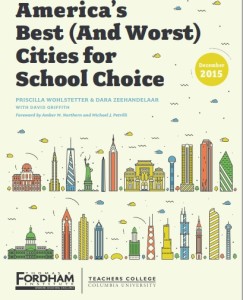School choice enjoys growing political support in Florida’s largest city, but that hasn’t led to plethora of high-quality options.
 At least not yet, according to a new report by the Thomas B. Fordham Institute, which looks at the school choice landscape in 30 large cities.
At least not yet, according to a new report by the Thomas B. Fordham Institute, which looks at the school choice landscape in 30 large cities.
Students in Jacksonville have access to multiple private school choice programs, a small-but-growing charter school sector, a host of magnet schools and a superintendent intent on adding more district-run options to the mix. All of them enjoy at least some support among district leaders and state policymakers.
Yet, the report says, critics who argue the city’s charters have grown too quickly to ensure quality may “have a point.”
Despite their rapid growth (or perhaps because of it), on average Jacksonville’s charters perform worse than its traditional district schools in reading— the only city in our study for which this is the case— and perform no better in math.
Jackonville’s still-young, but growing, collection of KIPP charter schools, which have improved their own academic performance and launched a collaboration with the Duval County school district, may be the most prominent sign of hope.
But the report suggests other steps cities like Jacksonville could take if they want to rival the likes of New Orleans, Washington and Denver, the cities the report says are home to the best choice ecosystems in the country.
Among them:
- Provide equitable resources for charter schools. In Florida, as in many other places, charters have less access to existing school buildings or funding for facilities, which means they sometimes have to dip into their classroom budgets.
- Expand public-school choice — something that has been proposed by both Superintendent Nikolai Vitti and the state Legislature, and could be tried again this year.
- Make choice more user-friendly, by providing parents useful information about different schools, transportation where they need it, and a common enrollment system.
- Mobilize external support for school choice.
While political support hasn’t translated into a proliferation of quality options yet, there are signs that it could, and that a few policy changes could help.


